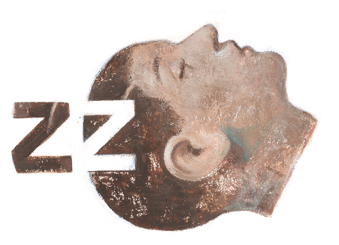Still a mystery after all these years
Gérard Dubois |
|
 |
|
By MICHELLE L. BRANDT
Last spring, during an interview with the New York Times, Eric Ripert, the celebrated chef of Le Bernardin Restaurant, divulged details of a recurring dream. “When I am about to have a difficult project, I dream I am climbing a mountain,” he shared. “When everything is going fine, I dream I am going down the mountain.”
Chances are good that the Times readers were able to relate. Who, after all, hasn’t had a dream that mirrors real-life troubles or joys? Who hasn’t had a dream that prompted the thought, “Wow — that had to have meant something”?
While the average person might believe that dreams mean something, little is known about why we dream. Fifty years ago, scientists discovered that sleep has distinct phases and that dreams usually happen during only one of them — the rapid eye movement or REM phase, during which the sleeper’s breathing, heart beat and brain waves speed up and the eyes move quickly behind closed lids. Since then, researchers have made no major breakthroughs nor reached anything close to consensus about the cause or meaning of dreams.
These days, just a few U.S. scientists study them intensively. Only 10 out of the more than 1,000 presentations at this year’s meeting of the Associated Professional Sleep Societies were about dreams.
Many experts, including William Dement, MD, PhD, a Stanford professor known as the “father of sleep medicine,” believe that dreams contain personal messages — and are linked to our emotions and mood. Others believe that dreams are simply random byproducts of the brain’s chemical changes.
There hasn’t always been rampant disagreement about dreams. For decades, scientists followed the theories of Sigmund Freud, who wrote in 1900 that dreams provide a harmless way to act out our unconscious fears or taboo thoughts.
If people weren’t able to dream, Freud said, they would become psychotic.
In the 1950s, scientists tried but were unable to prove a link between a lack of dream sleep and schizophrenia. Studies also showed that people’s dreams, like Ripert’s, correlated with what was happening in their lives, which went against Freud’s belief that dreams had little connection to daily activities and stresses.
Freud’s influence eventually lessened, but most sleep scientists still believed dreams said something about us. And psychoanalysts continued to examine dreams as a way to gain understanding of a patient’s inner thoughts.
The field was rocked, then, by the introduction of the so-called activation-synthesis model in the late 1970s. Two Harvard scientists argued that REM sleep is caused by the ebb and flow of neurotransmitters, and dreams are merely the brain’s attempt to make sense of these random neurological impulses.
“Up until this point, people thought dreams were the royal road to the unconscious,” Dement says. “These researchers tried to say that dreams are meaningless and random.”
Sleep researchers who rejected the theory call this era a particularly difficult one. Well-known dream researcher Rosalind Cartwright, PhD, with Rush University in Chicago, has said her field lost 20 years of research because of activation-synthesis.
“They did the field a disservice,” agrees Dement. “Their study was a good excuse to not support dream research.”
The pendulum swung again, though, when positron emission tomography scans and other new imaging technology allowed researchers to see which parts of the brain were active during the dream process. A 1998 study published in Science was the first to show that the portion of the brain that controls emotions, senses and long-term memory is active during dream states.
Experts say the study showed that dreaming is linked to emotion and not just a series of random events. Even skeptics have conceded that there must be some sort of relationship between dreams and emotions.
There is still much to learn about this link, and Dement predicts brain-imaging tools will yield answers. But Cartwright is more cautious.
“Not in my lifetime,” she says of the day full understanding of the cause — and meaning — of dreams arrives. “That leaves a lot of work to do for those willing to deal with elusive mysteries.”
Comments? Contact Stanford Medicine at

